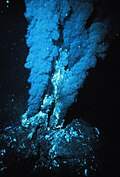Extreme environment
Extreme environments are conditions that are challenging for most forms of life to survive. These environments can be characterized by extremes of temperature, pressure, radiation, or chemical composition. Life forms that thrive in these conditions are known as extremophiles. Understanding extreme environments is crucial for various scientific fields, including astrobiology, environmental science, and biotechnology.
Characteristics
Extreme environments are defined by parameters that deviate significantly from the conditions that are commonly considered comfortable or even survivable for humans and most life forms. These include:
- High temperatures: Environments such as hydrothermal vents and hot springs can exceed 100°C.
- Low temperatures: Locations like the Antarctic or the deep sea can have temperatures well below 0°C.
- High pressure: The deep sea, especially the Mariana Trench, experiences pressures hundreds of times higher than the Earth's atmosphere.
- High radiation: Areas such as the Chernobyl Exclusion Zone or outer space expose organisms to levels of radiation that can damage DNA.
- Acidity/Alkalinity: Some environments have extreme pH levels, such as the acidic sulfur springs or the alkaline soda lakes.
- Salinity: Places like the Dead Sea have very high salt concentrations, which can be inhospitable to most life forms.
Adaptations
Organisms that live in extreme environments have developed unique adaptations to survive. These adaptations can be physiological, such as the production of antifreeze proteins in Antarctic fish, or biochemical, such as the use of specialized enzymes by thermophiles that remain active at high temperatures. Other adaptations include changes in membrane composition to withstand high pressures or the use of pigments to protect against radiation.
Research and Applications
Studying extreme environments and their inhabitants provides insights into the limits of life on Earth and informs the search for life in the universe. It also has practical applications in biotechnology, such as the use of extremophile enzymes in industrial processes that require extreme conditions.
Astrobiology
In astrobiology, extreme environments on Earth are studied as analogs for conditions on other planets and moons. For example, the study of microbes in the high radiation environment of Chernobyl can offer clues about the potential for life to withstand the radiation on the surface of Mars.
Environmental Science
In environmental science, understanding how life adapts to extreme conditions can help in the development of strategies for the restoration of environments damaged by pollution, climate change, or other factors.
Biotechnology
The enzymes and other molecules produced by extremophiles have applications in biotechnology, including in the pharmaceutical, chemical, and biofuel industries. For example, the polymerase enzyme from the thermophilic bacterium Thermus aquaticus is used in the polymerase chain reaction (PCR) technique, a fundamental process in molecular biology.
See Also
This article is a environment-related stub. You can help WikiMD by expanding it!
Transform your life with W8MD's budget GLP-1 injections from $125.
W8MD offers a medical weight loss program to lose weight in Philadelphia. Our physician-supervised medical weight loss provides:
- Most insurances accepted or discounted self-pay rates. We will obtain insurance prior authorizations if needed.
- Generic GLP1 weight loss injections from $125 for the starting dose.
- Also offer prescription weight loss medications including Phentermine, Qsymia, Diethylpropion, Contrave etc.
NYC weight loss doctor appointments
Start your NYC weight loss journey today at our NYC medical weight loss and Philadelphia medical weight loss clinics.
- Call 718-946-5500 to lose weight in NYC or for medical weight loss in Philadelphia 215-676-2334.
- Tags:NYC medical weight loss, Philadelphia lose weight Zepbound NYC, Budget GLP1 weight loss injections, Wegovy Philadelphia, Wegovy NYC, Philadelphia medical weight loss, Brookly weight loss and Wegovy NYC
|
WikiMD's Wellness Encyclopedia |
| Let Food Be Thy Medicine Medicine Thy Food - Hippocrates |
Medical Disclaimer: WikiMD is not a substitute for professional medical advice. The information on WikiMD is provided as an information resource only, may be incorrect, outdated or misleading, and is not to be used or relied on for any diagnostic or treatment purposes. Please consult your health care provider before making any healthcare decisions or for guidance about a specific medical condition. WikiMD expressly disclaims responsibility, and shall have no liability, for any damages, loss, injury, or liability whatsoever suffered as a result of your reliance on the information contained in this site. By visiting this site you agree to the foregoing terms and conditions, which may from time to time be changed or supplemented by WikiMD. If you do not agree to the foregoing terms and conditions, you should not enter or use this site. See full disclaimer.
Credits:Most images are courtesy of Wikimedia commons, and templates, categories Wikipedia, licensed under CC BY SA or similar.
Contributors: Prab R. Tumpati, MD







